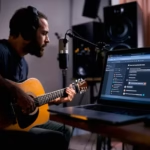Music Copyright Rules For Artists, it’s key to protect your work with music copyright. This ensures you get fair pay and keep your creative rights safe. We’ll cover the basics of copyright law, like the rights you get and how to register them. We’ll also talk about spotting and dealing with copyright issues. By the end, you’ll know how to protect your music.
Also Read: How To Write A Song?
Key Takeaways
- Music copyright is a critical aspect of the music industry that all artists must understand to protect their creative works.
- Copyright law grants copyright holders exclusive rights, such as the right to reproduce, distribute, and perform their works.
- Registering your copyrights offers additional benefits, including the ability to seek statutory damages and attorney’s fees in the event of infringement.
- Identifying and responding to copyright infringement is crucial to safeguarding your intellectual property.
- Licensing and derivative works can provide additional revenue streams for artists while maintaining control over their copyrights.
What is Copyright and How Does it Apply to Music?
Copyright is a way to protect original works like music. It gives the creator special rights to make, share, show, perform, and change their work. In music, it covers both the song’s words and tune, as well as the recording of a song. This is special in music and important for artists to know to protect their work.
Also Read: Best Music Schools In The USA
Definition and Scope of Copyright
Copyright is a legal protection for creative works like music. It stops others from using or copying the work without permission. The rights include making, sharing, showing, performing, and changing the work. These rights go to the creator, publisher, or record label, based on the situation.
The Two Copyrights in Music
Every song has two copyrights – one for the song itself and one for the recording. The copyright in the musical composition belongs to the songwriter or their company. The copyright in the sound recording belongs to the artist or their label. It’s important for artists to know this to license their work right and stop others from using it without permission.
| Copyright Type | Owner | Scope |
|---|---|---|
| Musical Composition | Songwriter(s) or Publishing Company | Lyrics and Melody |
| Sound Recording | Recording Artist or Record Label | Specific Performance |
“Understanding the dual copyright structure in music is essential for artists to protect their work and ensure proper licensing of their creations.”
Also Read: Music Theory For Beginners: Start Your Journey
Exclusive Rights Granted by Copyright

Copyright is a strong legal tool that gives the owner special rights over their creative work. These rights let the copyright holder control how their music is used and paid for. If someone uses a copyrighted work without permission, it’s called copyright infringement. This can lead to legal trouble and fines.
The exclusive rights given by copyright include:
- The right to reproduce the work
- The right to distribute copies of the work
- The right to create derivative versions of the work
- The right to publicly perform the work
- The right to publicly display the work
These rights let the copyright owner decide how their music is used and get paid for it. This way, copyright holders can make sure their work is used right and they get the credit and money they deserve.
Also Read: Tips For A Long Term Music Career
| Exclusive Right | Description |
|---|---|
| Reproduction | The right to make copies of the work, including physical copies and digital reproductions. |
| Distribution | The right to sell, rent, or otherwise distribute copies of the work to the public. |
| Derivative Works | The right to create new works that are based on or derived from the original work, such as remixes or adaptations. |
| Public Performance | The right to perform the work in public, such as during a live concert or broadcast. |
| Public Display | The right to display the work publicly, such as in an art gallery or on a website. |
Knowing about the exclusive rights of copyright helps artists and musicians protect their work. It also makes sure they get paid for their creativity.
Music Copyright Rules For Artists

Ownership and Duration of Copyright
In the music world, the creator of a song or recording usually owns the copyright. For songs made after 1978, the copyright lasts for 70 years after the creator dies. If there are multiple creators or if the work was made for hire, the copyright lasts 70 years after the last creator dies.
Also Read: Top Music Universities For World Music
Registration Process and Benefits
Copyright comes automatically when you create a new song. But, artists should register their work with the U.S. Copyright Office. This process is easy and has big benefits, like:
- Creating a public record of who owns the copyright
- Letting the artist sue for copyright infringement
- Enabling the artist to get statutory damages if someone copies their work
Registering your music copyrights gives you more ways to protect your work and fight against copyright issues.
| Benefit | Description |
|---|---|
| Public Record of Ownership | Registering your work makes a public record of who owns it. This helps prove ownership in court. |
| Ability to File Lawsuits | With a registered copyright, artists can sue for copyright infringement. You can’t sue without it. |
| Statutory Damages | Registered copyrights might let you get statutory damages. These can be a lot if someone copies your work. |
“Registering copyrights with the U.S. Copyright Office provides artists with essential protections and advantages in safeguarding their creative works.”
Identifying and Responding to Copyright Infringement

If an artist thinks someone has used their work without permission, they need to prove it. They must show they own the copyright and that the other person could see their work. They also need to prove the two works are very similar. This can be hard, so getting help from a lawyer who knows about intellectual property is often a good idea.
Proving Copyright Infringement
Showing that someone has used your work without permission is key. To make a strong case, the artist must prove:
- They own a valid copyright for the work.
- The other person had a chance to see the original work.
- The two works are very similar.
Legal Remedies for Infringement
If an artist proves someone has used their work without permission, they can get different legal remedies, such as:
- Orders to stop the illegal use.
- Taking back the illegal materials.
- Getting back actual damages and lost profits.
- Statutory damages of $750 to $150,000 per infringement, if the copyright was registered before the infringement or within three months after the work was shared.
Taking legal action for copyright infringement is hard and takes a lot of time. But, it’s often needed to protect an artist’s work and make sure they get the right remedies.
Licensing and Derivative Works

In the music world, copyright owners have the right to let others make new works based on theirs. They can allow others to use their music for covers, remixes, and more. Getting the right music licenses is key for artists to protect their work and get paid.
When an artist wants to cover a song or mix it with another work, they need the right derivative works licenses. They talk to the copyright owner, who might let them use the work for a fee or other deal.
The music industry has both voluntary and compulsory licenses. Voluntary licenses are made between the artist and the copyright owner. They let both sides agree on the terms. Compulsory licenses are set by law and make using cover songs more uniform.
Knowing how music licensing works and getting the right permissions is key for artists. It helps them make new works without breaking the law. By being informed and active, artists can make sure their work is legal and respect others’ rights.
“The music industry’s licensing framework is a delicate balance, requiring artists to navigate the complexities of copyright law and secure the necessary permissions to create their derivative works.”
Also Read : What Are The Key Techniques For Crafting Melodies And Lyrics?
Conclusion
In the music industry, knowing about music copyrights is crucial. This guide has shown artists how to handle music copyrights. It covers copyright law basics, the rights of creators, and how to protect their work.
Artists need to know about music copyright overview and music copyright rules for artists. They should also learn how to spot and deal with copyright infringement. Taking steps to protect their work helps artists avoid unauthorized use and keep control over their music.
This article’s music copyright overview is a key tool for artists. It helps them understand the music copyright system better. By using this knowledge and following the advice given, artists can protect their work. They can make sure their rights are respected and succeed in the music industry.
FAQs
Q: What is the process to copyright a song?
A: To copyright a song, you need to ensure that your musical work is fixed in a tangible form, such as a recording or sheet music. You can then register your copyright with the U.S. Copyright Office, which involves submitting a form and paying a filing fee. While you don’t need to register your music to have copyright protection, doing so provides additional legal benefits.
Q: What are the two types of copyright that musicians should be aware of?
A: The two types of copyright that musicians should be aware of are musical work copyright and sound recording copyright. The musical work copyright protects the composition and lyrics, while the sound recording copyright protects the specific recording of that composition.
Q: Who is considered the copyright owner of a musical work?
A: The copyright owner of a musical work is typically the composer or songwriter who created it. However, if a work is created under a work-for-hire agreement or if rights are assigned to a publisher, the copyright ownership may belong to a third party.
Q: How does copyright law protect musicians?
A: Copyright law protects musicians by granting them exclusive rights to their works, allowing them to control how their music is used, reproduced, and distributed. This includes rights to publicly perform or display their work and to license it for use by others, which can generate royalties.
Q: What does it mean for a work to be “fixed” in copyright terms?
A: For a work to be considered “fixed” in copyright terms, it must be captured in a tangible form that can be perceived, reproduced, or otherwise communicated. This can include formats like digital recordings, CDs, vinyl, or written sheet music.
Q: What is the role of the Harry Fox Agency in music copyright?
A: The Harry Fox Agency is a licensing agency that helps copyright owners manage their mechanical licenses. It acts as an intermediary between copyright owners and those who wish to use their music, ensuring that royalties are collected and distributed correctly.
Q: Do I need to register my music to be protected by copyright?
A: While you don’t need to register your music to have copyright protection, registering with the U.S. Copyright Office provides additional legal advantages, such as the ability to file an infringement lawsuit and claim statutory damages.
Q: What is a mechanical license, and when do I need it?
A: A mechanical license is required when you want to reproduce and distribute a copyrighted musical work, such as on CDs or vinyl. It allows you to legally use the underlying musical composition while ensuring that the copyright owner receives appropriate royalties.
Q: What are the consequences of copyright infringement in the music industry?
A: If someone is found liable for copyright infringement, they may face legal action, including an infringement lawsuit. This can result in significant financial penalties, the requirement to cease using the copyrighted material, and potential damages awarded to the copyright owner.




